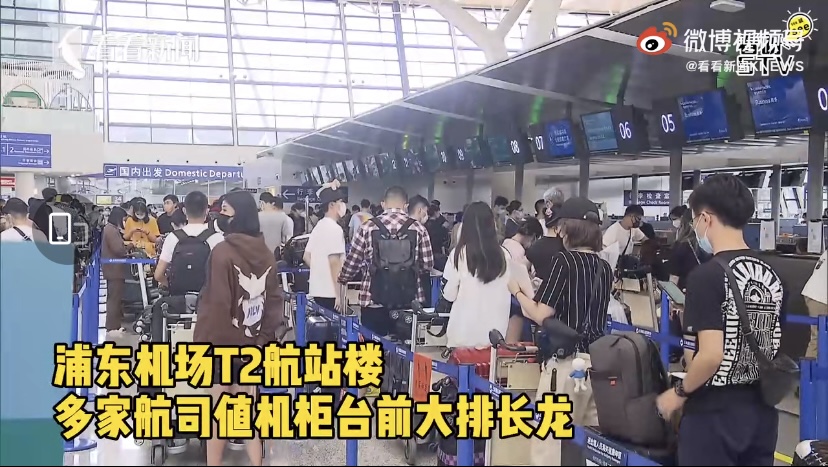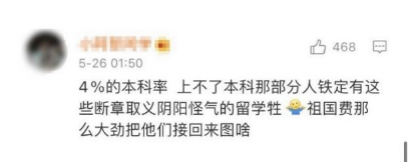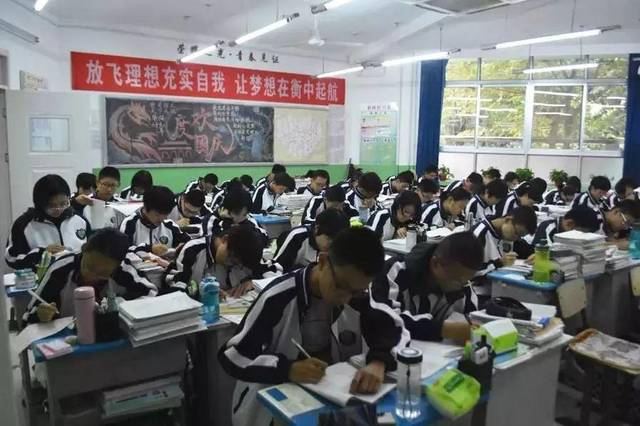
There are many motivations for whether or not to study abroad, only public pressure is excepted
The long line in Shanghai Pudong International Airport
On August 15th, 2021, the waiting line in front of the check-in counter at Shanghai Pudong International Airport is more than one kilometer long. Most of them are Chinese international students who are flying to foreign countries to study.

However, data shows that the number of Chinese students going to the United States to study is declining.
According to the data from the American platform Common App, an application website which helps students to find universities or colleges to apply for, the number of Chinese applicants for the new academic year of 2021 has decreased by 18% compared to the previous year. However, given the fact that the number of international applications has increased by 9% compared with the previous cycle, the decline trend of Chinese students is particularly obvious.
Looking back to the 2019-2020 academic year, a time when the global pandemic was rampant, the number of Chinese students who were being educated in colleges and universities in the US was 1,075,496, decreasing 1.8% compared with the academic year of 2018-2019, as The Open Doors Report 2020 conducted by the Institute of International Education shows.
However, the decreasing trend has not appeared for almost 10 years. The last time there was a decline in the number of students studying in the United States was during the 2008 financial crisis.
According to a news article by Grady Mcgregor from Fortune magazine, The declining interests in going to the U.S. among Chinese students is due to the visa restrictions on Chinese students, the increase in anti-Asian racism during the pandemic, and increased tensions between the U.S. and China.
Unlike those who decided not to study in the U.S., the students waiting in front of the check-in counter of the flight to U.S. has made up their mind to travel.
Xiangyu Qin, a staff member of Cathay Pacific airline, said that usually it only took 1-2 minutes for one person to check in. During the pandemic, the boarding procedure became more cumbersome than before. In addition to the travel itinerary and visa, passengers need to show their Chinese and English COVID test reports, residential address in the U.S., health declaration, and etc. at the check-in counter. As a result, an airport that operated normally before have become overloaded now.
Jiarui Peng, a student in Georgetown university said, “In the 2021 school year, Georgetown university mandates all students to participate in in-person classes, so I have to go to the United States, even if the ticket price is very expensive, even if I take the risk of being infected.”

An unfriendly public
On Chinese social media Weibo, in the comment section of a news report titled “Shanghai Pudong Airport responds to the reason of the long queues”, many do not understand the behavior of studying abroad.


In fact, this is not the first time international student as a group has received unfriendly comments on Weibo.
In May 2020, the diagnosed COVID-19 cases in China was almost 0, in the meanwhile, the pandemic situation in foreign countries was most serious, which was a time when many international students were trapped in China. Even if they were admitted by universities in other countries, they could not go abroad and finish their study. At the Chinese People’s Political Consultative Conference (CPPCC), a representative of the CPPCC suggested that some international students could consider studying in a vocational school nearby, which caused many sardonic comments on international students.


The unfriendliness faced by international students even comes from their own families. At the dinner table on New Year’s Eve, Jingyu Zhang’s uncles and aunts ask her what she plans to do after graduation. She tells her true thoughts: to get a master’s degree in the U.S. The lively dining table suddenly calms down for a few seconds, and then Jingyu’s aunt says: “It’s good to study abroad, but do you really think it’s necessary to spend so much money in another country? The United States is a dangerous place, why will you go there?” Jingyu does not say a word, and continues to finish her food, as if she has heard the same thing many times.
“Some news in China amplify the dangers faced by international students”, as Jingyu says. Wenqing Zhao, a professor in the Department of Journalism of Shanghai University, believes that Chinese online media has highlighted the “victim” side when shaping the image of Chinese overseas students, which is actually different from the real situation.
In August 2021, Jingyu boarded the flight to New York at Shanghai Pudong Airport, with the desire for a different culture and education.
Motivations of going abroad
Like Jingyu, all of the interviewees do not believe that public pressure is a decisive factor for whether or not to study abroad. “The only impact of online comments on me is to let me know that there are so many idiots”, Dalin Zhang, a graduate student at Johns Hopkins University says. What make them consider thoroughly are objective reasons such as expense, education, culture, career plan, and etc. According to the empirical study by Michael Brzezinski, Chinese students identified that the attraction of studying in the United States comes from various factors including gaining prestige, an intrinsic-personal attraction, and a way to get into a system perceived as more fair.
- “I don’t want to become a robot”
“I would describe myself as a rebellious person”, Dalin says, “I don’t want to become a robot”. When mentioning the life of undergraduate at the University of California, San Diego, Dalin explained that in the first two years of undergraduate education in the United States, students will be required to take general education courses. During 2 years’ general education, Dalin found the economic courses that he was interested in, and he insisted on this direction in his master’s degree and his career. “If I took the Gaokao exam in China and went to a Chinese university, I would not have this opportunity to find my real passion.”
Weilun Wang, a graduate student who studies in Anhui University in China has experienced the difficulty of not being able to study his favorite major after his Gaokao exam. However, after a semester of hard work, he finally had the opportunity to transfer from the logistics management major to the law major which he loved. “To change a major requires me to be ranked in the top 10% of my original major, and there will be a lot of paper work to be done afterwards. Before entering the law school, I also need to pass an admission exam”, as introduced by Weilun.
The Gaokao exam, or the college entrance examination in China is a national examination for the admission of colleges and universities. Every year, millions of candidates across the country take the Gaokao exam. For most students, what kind of university they can go to depends solely on a number — the Gaokao score. In 2016, the year when Zirui Shen took the Gaokao exam, there were 423,100 candidates in Hebei Province where he comes from, and the acceptance rate of first-level university was only 15.86%.

“I graduated from the famous ‘Gaokao industry’ — Hengshui Highschool”, Zirui says, “what the industry produces are robots for the Gaokao exam”. There were more than 3,000 students in the same grade with Zirui, but only 3 of them chose to study abroad. When Zirui was going to apply for Canadian visa in his senior year of high school, his teacher did not agree for him to go out of the classroom, telling his parents that “You made him unable to make serious preparations for the college entrance examination”. “I think the Gaokao system make things out of balance, and the method of blindly studying is not suitable for me, so I hope to be able to study abroad” said Zirui.
2. “The same seed will produce different fruits when growing on different soils”
“When I was a little girl, I felt that going abroad to study was a good thing for some unknown reasons”, Youzi Li, a graduate student at Georgetown University says. The generation born in the 1990s grew up watching Disney cartoons and Marvel movies, drinking Coca-Cola, wearing Nike and Adidas. “The western pop culture is rampant, and definitely has some influence on us”, Youzi clarified, “and this is the very first reason that I want to come to the U.S. to explore the culture and life here.”

Youzi is not the only one who was attracted by culture. A classmate of her, Zhuoqian Li, maintains that exploring different culture is the only reason that she comes to the U.S. Zhuoqian used a poetic metaphor for the influence of the study-abroad experience: “The same seed will produce different fruits when growing on different soils”.
“I majored in Journalism in undergraduate school in China”, Boyu Wang, another classmate of Youzi says, “I think the education in Chinese universities is indoctrinating, while the teaching format here is more diverse. There will be many collisions of ideas in each class. I can even ‘fight’ with the professor”, Boyu laughed.
United States is not the only choice
1. “I want to give myself more possibilities”
On May 29, 2020, US President Trump signed a ban on Chinese students. Most of the affected students are science, technology, engineering and mathematics (STEM) students who are suspected of engaging in espionage. At the same time, students who graduated from certain universities are also considered as highly suspicious. Under this circumstance, Wenbo Shi, majored in computer science and graduated from Xi’an Jiaotong University, was admitted by several top universities in the United States, including Duke university and University of California San Diego.
One month after the ban was issued, Wenbo posted a sentence on WeChat: Goodbye, the seaside university which I never had a chance to look at closely. He decided to work temporarily for Tencent, one of the Internet giant companies in China.

“I want to give myself more possibilities”. At the beginning of 2021, Wenbo applied to several universities in Singapore. So far, he has studied at National University of Singapore for three months. In addition to studying, Wenbo and his girlfriend’s favorite daily routines are cooking and walking together. “At first, Singapore was only an alternative for me, but now I think this is where I want to settle down in the future”, Wenbo says.
Photos shared by Wenbo
2. “Applying for a Master’s degree in China is like gambling”
In China, students also need to pass an exam like the Gaokao exam to apply for a master’s degree. Unlike the United States, Chinese candidates can only apply for one major in one university. Even if their Graduate Entrance Examination scores are much higher than the university’s requirement, they don’t have a chance to go to a better university; and if their scores do not reach the requirement of the program they applied, usually they will be transferred to a much worse university that does not match the score they got.
‘It’s like a gambling”, Weilun Wang said, “but it’s worthy”. Weilun is now a second-year graduate student at Anhui University in China. He never thought about studying abroad because he felt that his parents could not afford the tuition fee of tens of thousands of dollars a year. Participating in the Graduate Entrance Examination is the best way for him to improve himself. “Graduate study has achieved many of my dreams,” Weilun said. After enrolling in Anhui University, he ran for a senator in student union, participated in many voluntary activities, and passed several exams for certificates. Now, he has published two papers, and his goal is to apply for a national scholarship after publishing four papers.
At the end of the interview, I asked Weilun about his opinions of Chinese international students. He said that he thinks studying abroad is difficult. The pressure of being away from home is beyond his imagination.
In fact, although everyone has a different background, every interviewee has the same respect for people who are different from himself or herself. Whether to study abroad and which country to study in are choices made by each individual after careful consideration, without being influenced by others. As Martin Luther King once said, we must learn to live together as brothers and sisters, or perish together as fools.

Thanks to the interviewees: Wenbo Shi, Zhuoqian Li, Dalin Zhang, Zirui Shen, Youzi Li, Boyu Wang, Jiarui Peng, Jingyu Zhang and Weilun Wang.
References
Shanghai Pudong Airport responds the reason of the long queues. Weibo. (2021, August 17). Retrieved November 30, 2021, from https://m.weibo.cn/1845864154/4671280907555008
McGregor, G. (2021, August 16). U.S. higher education: Universities face having too few Chinese students. Fortune. Retrieved November 27, 2021, from https://fortune.com/2021/08/16/us-universities-international-students-china-covid/.
CCG Releases Annual Report on the Development of Chinese Students Studying Abroad (2020-2021). Center for China & Globalization. (2021, March 2). Retrieved November 15, 2021, from http://en.ccg.org.cn/archives/70684.
Zhao, W. 赵文庆 (2017). The Weakened Victims—The construction of the media image of Chinese international students by the domestic Online media. 被弱者化的受害者——国内网络媒体对中国留学生的媒介形象建构. Journal of News Research 新闻研究导刊, 8(8). 1674-8883(2017)08-0055-02.
Brzezinski, M. (1994). Migration & opportunity: A qualitative understanding of the Chinese student Brain Drain phenomena. NASFA working paper, No. 41, NASFA, Washington, D.C.
Yan, K., & Berliner, D. C. (2010). Chinese international students in the United States: Demographic trends, motivations, acculturation features and adjustment challenges. Asia Pacific Education Review, 12(2), 173–184. https://doi.org/10.1007/s12564-010-9117-x
Hollingsworth, J., Xiong, Y., & Culver, D. (2021, August 10). A trump-era policy that shut out top Chinese students could be hurting America more than Beijing. CNN. Retrieved November 29, 2021, from https://www.cnn.com/2021/08/06/asia/china-united-states-students-visa-ban-intl-hnk-dst/index.html.




